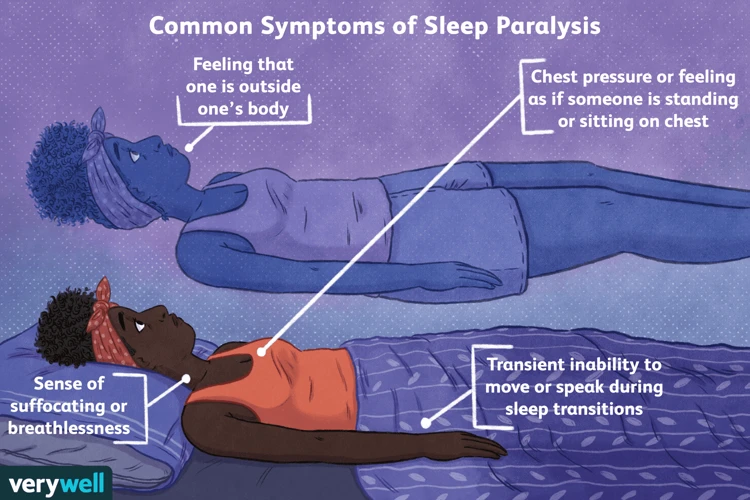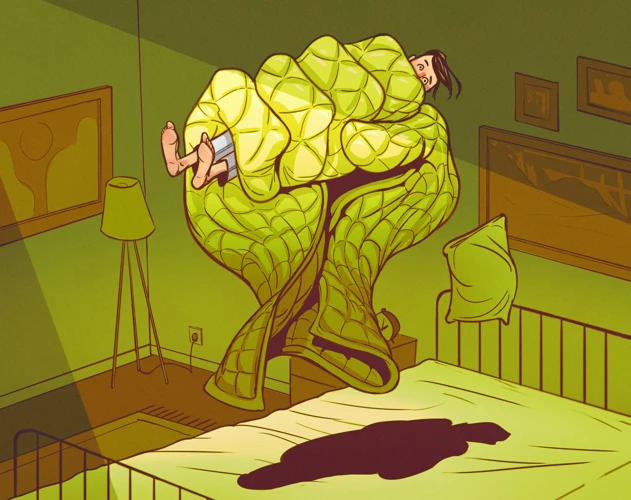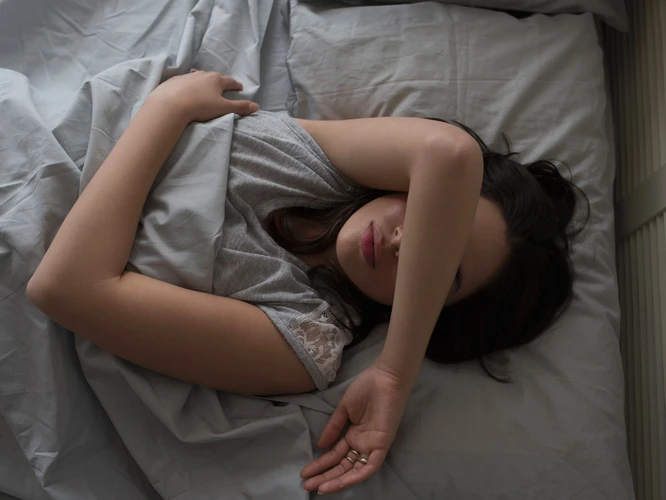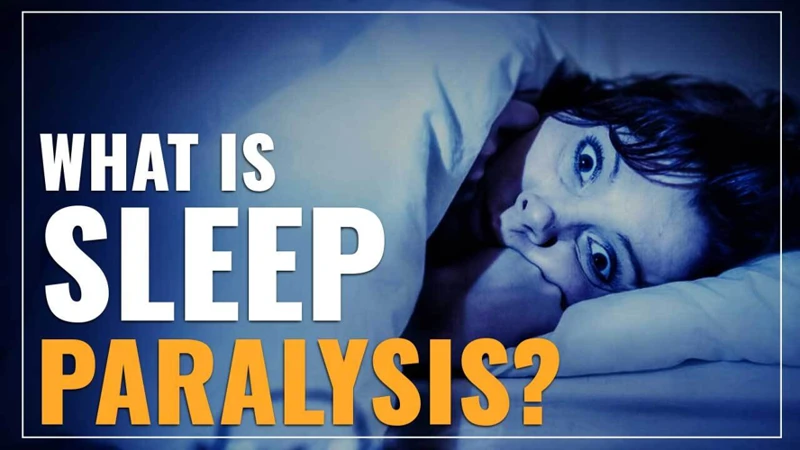Have you ever woken up in the middle of the night feeling like you can’t move, as if you’re paralyzed? This frightening experience is known as sleep paralysis and it affects millions of people worldwide. It can be accompanied by hallucinations and a sense of terror, leaving individuals feeling overwhelmed and unable to sleep. While it’s not a life-threatening condition, it can greatly impact one’s quality of life. If you’re among the many who suffer from sleep paralysis, don’t despair! There are steps you can take to train your body and mind to avoid this unpleasant experience. In this article, we’ll explore the causes and symptoms of sleep paralysis and provide you with helpful tips and techniques that can help you overcome it.
What is Sleep Paralysis?

One of the most terrifying experiences that can happen during sleep is the inability to move or speak upon waking up, accompanied by a feeling of pressure on the chest. This state is known as sleep paralysis and can cause intense fear and anxiety for those who experience it. But what exactly is sleep paralysis? Let’s take a closer look at this phenomenon and explore its symptoms and causes.
Symptoms of Sleep Paralysis
During sleep paralysis, the person is unable to move their body, despite being fully aware of their surroundings. They may experience a range of symptoms that can be quite distressing. Some of the most common symptoms of sleep paralysis are:
| Symptom | Description |
|---|---|
| Immobility | The individual is unable to move their body, or even their eyes, despite being fully conscious. |
| Hallucinations | The person may experience vivid and alarming visual, auditory, or sensory hallucinations. These can range from feeling a presence in the room to seeing and hearing threatening figures or creatures. |
| Breathing Difficulties | Some people may feel as if they are suffocating or cannot catch their breath during episodes of sleep paralysis. |
| Panic or Anxiety | Given the bizarre nature of the experience, it is common for people to experience panic or anxiety during sleep paralysis episodes. This can exacerbate the feeling of being trapped and unable to move. |
| Pressure or Weight on Chest | Some individuals may also feel as if there is a heavy weight on their chest, making it impossible to breathe. |
These symptoms can happen individually or in combination during sleep paralysis. It is important to note that while the experience of sleep paralysis can be quite scary and distressing, it is not considered to be a medical emergency.
Causes of Sleep Paralysis
Sleep paralysis is a condition that can be caused by various factors. It can happen to anyone regardless of age, gender, or health condition. Below are the causes of sleep paralysis:
| Cause | Description |
|---|---|
| Disrupting Sleep Patterns | Irregular sleep patterns, sleeping on an irregular schedule, or not getting enough sleep can cause the onset of sleep paralysis. |
| Genetics | Research has shown that genetics may play a role in the development of sleep paralysis. Studies have found that people with a family history of sleep-related issues are more likely to experience sleep paralysis. |
| Stress and Anxiety | Stress and anxiety can lead to a lack of sleep or abnormal sleep patterns, which can trigger sleep paralysis. Additionally, people who have anxiety disorders may be more likely to experience sleep paralysis than those who do not. |
| Other Sleep Disorders | Other sleep disorders such as sleep apnea, narcolepsy, and restless leg syndrome can increase the likelihood of experiencing sleep paralysis. |
| Medications | Some medications or drugs, such as those used to treat ADHD or depression, can interfere with the sleep cycle and lead to sleep paralysis. |
| Substance Abuse | Substance abuse, particularly with drugs or alcohol, has been linked to episodes of sleep paralysis. |
It is important to note that not everyone who experiences these factors will have sleep paralysis. However, being aware of these potential triggers can help individuals take steps to prevent or manage sleep paralysis episodes.
Why Do People Experience Sleep Paralysis?

Sleep paralysis is a phenomenon that results in the temporary inability to move or speak when falling asleep or waking up. It is a common experience that can happen to anyone, but some people may be more prone to it.
There are several factors that can contribute to sleep paralysis. One of the most common causes is disrupted sleep schedules or inadequate sleep. When the body is sleep-deprived, it may not go through the natural sleep cycles properly, which can result in sleep paralysis.
Another cause of sleep paralysis is stress and anxiety. Excessive worry or anxiety can make it difficult to fall asleep and stay asleep, which can lead to sleep paralysis. Certain mental health conditions, such as depression and PTSD, may also increase the likelihood of experiencing sleep paralysis.
Physical factors may also contribute to sleep paralysis. Sleep apnea, a condition where a person stops breathing temporarily during sleep, can disrupt sleep and lead to sleep paralysis. Additionally, certain medications or substances, such as alcohol or drugs, may increase the risk of sleep paralysis.
Finally, genetics may also play a role in sleep paralysis. Studies have suggested that there may be a genetic component to sleep paralysis, with some individuals being more susceptible to it than others.
While the exact causes of sleep paralysis are not fully understood, it is clear that a variety of factors can contribute to this phenomenon. By understanding the potential causes, individuals may be better equipped to prevent or manage sleep paralysis when it does occur.
How to Train Yourself to Avoid Sleep Paralysis

When it comes to sleep paralysis, prevention is key. Although it’s a common experience, it can be extremely frightening and unsettling. If you’ve experienced sleep paralysis before, you know just how terrifying it can be to feel trapped in your own body. However, there are ways to train yourself to avoid experiencing sleep paralysis altogether. By implementing strong sleep hygiene practices, relaxation techniques, cognitive behavioral therapy, and lifestyle changes, you can decrease your chances of experiencing sleep paralysis and improve your overall sleep quality. In this section, we’ll explore these techniques in depth to help you train yourself to avoid sleep paralysis.
Sleep Hygiene for Better Rest
Taking care of your sleep hygiene is crucial in avoiding sleep paralysis. Sleep hygiene refers to healthy sleep habits that help improve your sleep quality. Here are some tips to improve your sleep hygiene:
| Tips for better sleep hygiene | Explanation |
|---|---|
| Stick to a sleep schedule | Try to go to bed and wake up at the same time every day, even on weekends. This helps regulate your body’s sleep-wake cycle. |
| Create a bedtime routine | Establish a relaxing routine before bed, such as reading or taking a warm bath. This signals to the brain that it’s time to wind down and sleep. |
| Avoid stimulants | Avoid caffeine, nicotine, and alcohol at least four hours before bedtime. These substances can disrupt your sleep. |
| Avoid electronics | Avoid using electronic devices like smartphones, tablets or laptops, especially in the bedroom. The blue light emitted from these devices can interfere with your sleep mechanism. |
| Make your bedroom comfortable | Ensure that your bedroom is cool, quiet, and dark. Use comfortable pillows and mattress, and keep the room clean and tidy |
By following these sleep hygiene tips, you can improve your sleep quality and avoid sleep paralysis.
Relaxation Techniques for Improved Sleep
If you’re struggling with sleep paralysis, relaxation techniques can help you overcome the problem. Here are some techniques to help you relax and achieve sound sleep:
- Progressive Muscle Relaxation: This technique involves tensing and relaxing each muscle group in your body, starting from your feet and moving up to your head. It promotes relaxation and reduces muscle tension, helping you fall asleep more easily.
- Deep Breathing: Deep breathing can promote relaxation by slowing down your heart rate and lowering your blood pressure. It is particularly effective when practiced before bedtime. You can try inhaling deeply through your nose and exhaling slowly through your mouth.
- Aromatherapy: Aromatherapy involves using scents to promote relaxation and restful sleep. Essential oils such as lavender, chamomile, and jasmine can be added to a diffuser or applied to a pillow to promote relaxation and improve sleep quality.
- Yoga: Practicing yoga can help reduce stress and anxiety, leading to better sleep quality. Certain poses, such as the corpse pose, the child’s pose, and the cat-cow pose, can be particularly effective in promoting relaxation and reducing tension in the body.
- Visualization: Visualization involves creating mental imagery that promotes relaxation and calmness. It can be as simple as picturing yourself in a peaceful place, such as a beach or a forest. Visualization can promote a sense of calm and make it easier to fall asleep.
These relaxation techniques are not only effective in reducing sleep paralysis but they also promote overall better sleep quality. Incorporating these techniques into your bedtime routine will provide you with the restful and peaceful sleep that you deserve.
Cognitive Behavioral Therapy for Sleep Paralysis
One effective way to treat sleep paralysis is through cognitive behavioral therapy (CBT), which focuses on identifying and changing negative thought patterns and behaviors. CBT targets the underlying causes of sleep paralysis, such as stress and anxiety.
During CBT sessions, a therapist works with the individual to identify any negative beliefs and attitudes towards sleep and to develop coping strategies. This can involve practicing relaxation techniques, developing positive sleep habits, and confronting and challenging negative thoughts.
CBT can also help individuals overcome any fear or anxiety associated with experiencing sleep paralysis. By changing the individual’s perception of the experience, CBT can help reduce the frequency and severity of sleep paralysis episodes.
Below is a table outlining the steps involved in CBT for sleep paralysis:
| Step | Description |
|---|---|
| 1 | Identify negative thought patterns and behaviors related to sleep |
| 2 | Develop coping strategies for managing stress and anxiety |
| 3 | Practice relaxation techniques, such as deep breathing and progressive muscle relaxation |
| 4 | Develop positive sleep habits, such as maintaining a consistent sleep schedule and creating a relaxing bedtime routine |
| 5 | Confront and challenge negative thoughts and beliefs about sleep paralysis |
CBT can be an effective method for managing sleep paralysis by addressing the underlying causes and strengthening coping skills. If you are struggling with sleep paralysis, it may be helpful to seek out a qualified therapist who specializes in CBT.
Stress Management and Lifestyle Changes
One of the best ways to avoid sleep paralysis is by managing stress and making necessary lifestyle changes. Here are some tips to help with that:
- Identify the sources of stress: The first step in managing stress is identifying its sources. Take note of what triggers your anxiety and what situations make you more prone to experiencing sleep paralysis. Identifying the cause can help you find ways to avoid the triggers.
- Practice relaxation techniques regularly: Relaxation techniques can help soothe your mind and body and reduce stress levels. Meditation, deep breathing exercises, and progressive muscle relaxation are some examples of these techniques. Make it a habit of practicing them regularly, especially before bedtime to help prevent sleep paralysis.
- Stick to a regular sleep schedule: Disruptions to your usual sleep pattern can increase your risk of experiencing sleep paralysis. Try to maintain a consistent sleep schedule, preferably by going to bed and waking up at the same time every day. This helps regulate your body’s internal clock, ensuring that you get the recommended hours of sleep each night.
- Limit caffeine intake: Caffeine is a stimulant that can interfere with your sleep quality and lead to sleep disturbances. Consider cutting back on your intake or avoiding it altogether, especially in the afternoon and evening.
- Avoid alcohol and smoking: These substances can disrupt your sleep and contribute to stress and anxiety. Quitting smoking and limiting your alcohol intake can help improve your overall health and reduce the risk of sleep paralysis.
- Find time for relaxation and recreation: Allotting time for activities that you enjoy can help reduce stress and promote relaxation. Whether it’s spending time with loved ones or pursuing a hobby, make time for things that make you happy and help you unwind.
By incorporating these stress management and lifestyle changes into your daily routine, you can minimize the risk of experiencing sleep paralysis and improve your overall physical and mental wellbeing.
Other Tips and Techniques for Better Sleep

As we’ve discussed, sleep paralysis can be a frightening and disruptive experience. While there are techniques to train yourself to avoid it, there are also other tips and tricks that can improve the overall quality of your sleep. By implementing the following bedroom environment changes, nutrition modifications, exercise routines, and even herbal remedies, you can set yourself up for success in getting the restful, uninterrupted sleep that your mind and body need.
Bedroom Environment and Sleep Position
Creating a conducive bedroom environment and adopting a good sleep position can help in avoiding sleep paralysis. Here are some tips to make your bedroom a comfortable sleep haven:
- Keep it dark: Ensure that your bedroom is completely dark, by covering windows with blinds or curtains. This can help signal your body to produce melatonin, the hormone responsible for inducing sleep.
- Ensure proper temperature: Maintain a comfortable temperature in your bedroom between 60-68°F (15-20°C).
- Minimize noise: If you live in a noisy area, consider using a white noise machine or earplugs to create a quiet environment.
- Remove distractions: Keep gadgets and devices away from your bed, as the light from these devices can trick your brain into thinking it’s daytime and interfere with your sleep.
- Use comfortable bedding: Invest in comfortable and supportive pillows and mattresses.
In addition to creating a conducive bedroom environment, adopting a good sleep position can help in preventing sleep paralysis. Here are some positions to try:
- Sleep on your side: Sleeping on your side can prevent the relaxation of the tongue and throat muscles that can cause sleep apnea, a major cause of sleep paralysis.
- Avoid sleeping on your back: Sleeping on your back can increase the risk of sleep apnea and lead to more frequent episodes of sleep paralysis.
- Elevate your head: Elevating your head with a pillow can help prevent snoring and relieve sleep apnea symptoms.
- Avoid sleeping in awkward positions: Avoid sleeping in positions that can restrict blood flow or cause numbness. This can trigger the onset of sleep paralysis episodes.
Adopting good sleep habits and practices can help in minimizing the risk of sleep paralysis.
Nutrition and Sleep
The food we eat plays a crucial role not only in our overall health but also in the quality of our sleep. Eating a well-balanced diet and avoiding certain foods and drinks can improve our sleep hygiene and potentially reduce the likelihood of sleep paralysis. Consider incorporating the following nutrient-rich foods into your diet for better sleep:
| Nutrient | Food Sources |
|---|---|
| complex carbohydrates | whole wheat bread, brown rice, sweet potatoes |
| tryptophan | turkey, chicken, fish, dairy products, nuts, beans |
| magnesium | spinach, almonds, cashews, black beans, edamame |
| calcium | milk, cheese, yogurt, leafy greens |
In contrast, certain foods and drinks can negatively impact our sleep, leading to more frequent awakenings throughout the night and potentially increasing the risk of sleep paralysis. The following items should be avoided or consumed in moderation:
- Caffeine: found in coffee, tea, soda, and chocolate
- Alcohol: can disrupt sleep patterns and lead to frequent awakenings
- Heavy meals: can cause discomfort and indigestion, making it harder to fall asleep
- Spicy or acidic foods: can cause heartburn, leading to discomfort during sleep
Making changes to your diet and consuming the right foods and drinks can help improve your overall sleep quality, potentially reducing the likelihood of sleep paralysis.
Exercise and Sleep Quality
Regular exercise is not only beneficial for physical health, but it can also improve sleep quality. Studies have shown that engaging in physical activity can reduce the time it takes to fall asleep and increase the duration of deep sleep. This can lead to feeling more rested and refreshed upon waking up in the morning.
One study conducted by the National Sleep Foundation found that individuals who exercised regularly reported better sleep quality than those who did not. The study also found that those who engaged in high-intensity exercise reported better sleep than those who only did moderate exercise.
Types of Exercise
When it comes to improving sleep quality, not all exercises are created equal. While any physical activity is better than none, certain types of exercise have been shown to be especially beneficial for sleep. These include:
| Exercise Type | Description |
|---|---|
| Aerobic Exercise | Activities that increase heart rate and breathing, such as running, biking, or swimming. |
| Strength Training | Activities that build muscle, such as weightlifting or resistance band exercises. |
| Yoga | A combination of strength, flexibility, and relaxation exercises that can help reduce stress and promote better sleep. |
When to Exercise
The timing of exercise can also have an impact on sleep quality. Exercising too close to bedtime can actually have a negative effect on sleep, as it can stimulate the body and make it harder to fall asleep. Experts recommend finishing exercise at least three hours before bedtime, in order to give the body time to wind down and prepare for sleep.
Additional Tips
In addition to choosing the right type of exercise and timing it properly, there are a few additional tips that can help maximize the sleep-promoting effects of physical activity. These include:
- Exercising outdoors in natural sunlight
- Staying hydrated throughout the day
- Avoiding caffeine and alcohol
- Wearing comfortable clothing and footwear
By incorporating regular exercise into your routine and following these tips, you can improve the quality of your sleep and reduce the likelihood of experiencing sleep paralysis.
Herbal Remedies for Sleep Paralysis
There are several herbal remedies that may help reduce the occurrences of sleep paralysis. Many of these remedies have been used for centuries to promote relaxation and improve sleep quality. However, it’s important to note that more research is needed to confirm their effectiveness.
Here are some common herbal remedies for sleep paralysis:
| Herbal remedy | Description |
|---|---|
| Valerian root | Valerian root has been used for centuries as a natural sleep aid. It may help improve the quality of sleep and reduce the occurrences of sleep paralysis. |
| Kava | Kava is a plant that is commonly used for its calming effects. It may help reduce anxiety and promote better sleep. |
| Passionflower | Passionflower has a calming effect on the body and may help reduce anxiety and improve sleep quality. It is particularly effective when combined with other herbs, such as valerian root. |
| Chamomile | Chamomile is a calming herb that is often used to promote relaxation and improve sleep quality. It may also help reduce anxiety and stress. |
| Lemon balm | Lemon balm has a calming effect on the body and may help reduce anxiety and promote better sleep. |
It’s important to note that herbal remedies can interact with medications, so it’s important to speak with a healthcare professional before using them. Additionally, individuals with certain medical conditions or allergies may be advised to avoid certain herbs. As with any treatment, it’s important to find what works best for you and to continue to prioritize healthy sleep habits.
When to See a Doctor
It’s important to remember that occasional sleep paralysis episodes are common and usually harmless. However, if you experience these episodes frequently, you may want to consider seeking medical attention. In some cases, sleep paralysis may be a symptom of an underlying sleep disorder such as narcolepsy.
When should you see a doctor for sleep paralysis?
If you experience sleep paralysis regularly or it is affecting your quality of life, make an appointment with your healthcare provider or a sleep specialist. Your doctor will ask about your symptoms and medical history, and may suggest some tests to rule out any underlying conditions. They may also refer you to a sleep specialist for further evaluation.
What can a doctor do for sleep paralysis?
Your doctor may suggest lifestyle changes, relaxation techniques, or cognitive behavioral therapy to help manage sleep paralysis. They may also prescribe medication to improve sleep quality or treat any underlying sleep disorders.
What other conditions could cause sleep paralysis?
Sleep paralysis can sometimes be a symptom of other conditions, including anxiety disorders, depression, and migraine headaches. Your doctor may evaluate you for these conditions if they suspect they may be contributing to your sleep paralysis episodes.
While infrequent sleep paralysis episodes are normal, frequent episodes may be a sign of an underlying sleep disorder or other medical condition. If you are concerned about your sleep paralysis, don’t hesitate to make an appointment with your doctor or a sleep specialist to discuss your options for management and treatment.
Conclusion
In conclusion, sleep paralysis is a frightening experience that can disrupt our sleep and leave us feeling frightened and anxious. However, there are steps we can take to reduce our likelihood of experiencing sleep paralysis. By improving our sleep hygiene, practicing relaxation techniques, and making lifestyle changes, we can create an environment that promotes peaceful sleep and minimizes the likelihood of sleep paralysis.
It is important to remember that sleep paralysis is a common but treatable sleep disorder. If you are experiencing regular sleep paralysis episodes, it may be a good idea to seek help from a medical professional. They can help you diagnose the underlying cause of your sleep paralysis and develop a personalized treatment plan to help you manage your symptoms.
By adopting healthy sleep habits and reducing the amount of stress and anxiety in our lives, we can improve our overall sleep quality and reduce our likelihood of experiencing sleep paralysis. The key is to be patient and persistent in our efforts to improve our sleep health. With time and practice, we can create the ideal environment for a peaceful and rejuvenating rest.
Frequently Asked Questions
What is the best sleep position to avoid sleep paralysis?
Experts suggest sleeping on your side to reduce the risk of sleep paralysis episodes.
Can stress cause sleep paralysis?
Yes, stress and anxiety can trigger sleep paralysis episodes.
Can sleep paralysis be prevented with medications?
There is no medication specifically designed to prevent sleep paralysis, but some antidepressants and sleeping pills may help reduce the frequency of episodes.
How long does sleep paralysis last?
Sleep paralysis can last from a few seconds up to several minutes.
Is sleep paralysis harmful to your health?
Although sleep paralysis can be frightening, it is not physically harmful to your health.
Can sleep paralysis occur during daytime naps?
Yes, sleep paralysis can occur during daytime naps, especially if you have an irregular sleep schedule.
What foods should I avoid to improve my sleep hygiene?
Avoid caffeine, alcohol, and heavy meals before bedtime to improve your sleep hygiene.
What is hypnagogic hallucination?
Hypnagogic hallucination is a sensory experience that occurs during the transition from wakefulness to sleep, and it can sometimes accompany sleep paralysis episodes.
Can sleep paralysis be a symptom of other sleep disorders?
Yes, sleep paralysis can be a symptom of other sleep disorders, such as narcolepsy.
Can changing my sleep schedule reduce the frequency of sleep paralysis?
Yes, establishing a regular sleep schedule and getting enough sleep can reduce the frequency of sleep paralysis episodes.








